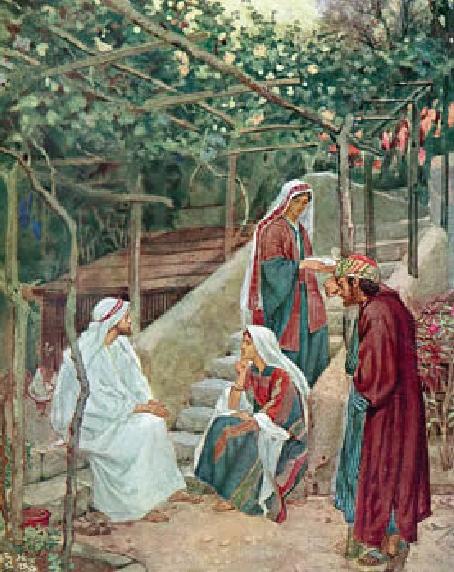31SundayA (30 Oct 2011)
Homily of Fr. Paul Panaretos, S.J.
To Keep New God’s Covenant
The Second Vatican Council, nearly 50 years ago, did much to dim anti-Catholic bias. I am not old enough to have memories of solid, long-lived anti-Catholic sentiment directed against me or our church. That sentiment was ebbing in my boyhood. Fewer younger Catholics have experienced it. Yet it did exist.
In the not so distant past others lumped Catholics in the United States along with other lower classes. Signs reading “Dogs and Irish keep off the lawn” were a common in the heyday of immigration. Beginning before that and persisting too long, the Ku Klux Klan despised Catholics along with Jews and blacks. Catholics struggled against being so defined by others.
 An incident near my birthplace in Detroit gave voice to that struggle. The Klan burned a cross on the lawn of the Shrine of the Little Flower, the Royal Oak, Michigan, parish where radio-priest Charles Coughlin was pastor. His response was brief: “I will build a cross you can never burn.” Fr. Coughlin built a freestanding, still standing bell-tower with the cross in relief on its four sides and crucified Jesus visible to passersby.
An incident near my birthplace in Detroit gave voice to that struggle. The Klan burned a cross on the lawn of the Shrine of the Little Flower, the Royal Oak, Michigan, parish where radio-priest Charles Coughlin was pastor. His response was brief: “I will build a cross you can never burn.” Fr. Coughlin built a freestanding, still standing bell-tower with the cross in relief on its four sides and crucified Jesus visible to passersby.
Grandparents and great-grandparents have told you their stories. My point is that times not long ago did not see Catholics in the positions of influence, management and authority as in the past 50 years. We defined ourselves in relationship to people and movements more dominant than us. An advantage was we Catholics knew ourselves more clearly.
We risk losing our true identity when we lose sight of responsibility which accompanies power. We also risk losing our true identity when we minimize our relationship with God and keep our ways rather than the commandments and do not live out of the beatitudes. In a phrase, we void the covenant, by which God chose us not to show partiality.
Prophet Malachi put that starkly: we break faith with one another. But who admits that? St. Paul reminded us of three textures of practicing God’s covenant and keeping faith with others: gentle...as a nursing mother cares for her children; working without ceasing to incarnate the gospel; and thanking God unceasingly.
When we don’t have to define ourselves by others more dominant than ourselves we too easily run the risk of being preoccupied with ourselves. Concern for others, gospel living and thanking God go out the window. In Jesus’ day the Pharisees stumbled on that risk. They had taken their seat on the chair of Moses by God’s design. Their position as teachers and leaders led them not to practice what they taught; to burden people excessively; to make aggressive missionary travels; and to allow tithing, ritual purity and even the honorific title of Rabbi to be more central than God. God has but one family, the human race, and one desire, the salvation of all beginning in each present moment. God’s self-donation in Jesus was how God chose to work our salvation.
Jesus was crystal clear about his identity: the self-donating God in flesh is the Messiah of God, our one master. Service characterizes our one master’s saving power. Jesus embodied everything God so patiently revealed. Other valid teachers did not: observe all things what-soever [the Pharisees] tell you, but do not follow their example. That included honorific titles and being religious to win others’ approval, which is not holy at all.
Our limitations demand order and leadership. When we are smitten by or addicted to order and rank we are not humble as our Master, Messiah Jesus. That too easily happens when we ascend in influence and control, beginning in child-hood. Even as adults we continue to make excuses so we may grip influence and control.
How are we like our master? When we stand in relationship with each other and together stand in relationship with the poor, the outcast, those pushed to the margins. Christian identity is clearer on the margins, but we are not there any more. Temptations of all kinds blind us to God and, more, to each other. Jesus does not call us to trample sound self-esteem. He calls us to renew our covenant with him and his God and Father. That takes a healthy sense of self.
Give Jesus 15 minutes each day this week.
- Pause in the love by which the Trinity creates you each moment.
- Ask St. Paul to present you to Jesus so you may converse with him.
- In your words speak with Jesus: praise him for revealing God to you by his strong tenderness.
- Ask Jesus for the grace to live his strong tenderness by your choices, your actions, your life.
- Close saying slowly the Lord’s Prayer. Jesus gave us his prayer as the key to unlock our hearts so we may live more readily and clearly as his companions and disciples.
________________________________________________________________________
Wiki-image by Carptrash of the Shrine of the Little Flower exterior is used according to the Creative Commons Attribution-ShareAlike 3.0 license. Wiki-image of Jesus conversing is in the public domain in the U.S.

No comments:
Post a Comment